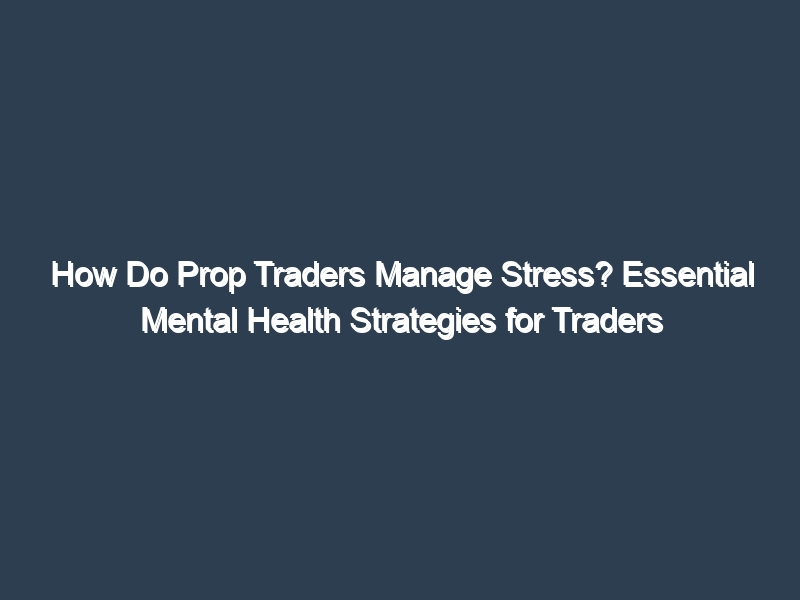
8 Feb
How Do Prop Traders Manage Stress? Essential Mental Health Strategies for Traders
Trading is an exhilarating yet stressful endeavor, characterized by high stakes and rapid decision-making that often lead to increased pressure.
Understanding the causes and effects of stress in trading is crucial for maintaining your performance and overall mental well-being.
This article examines the importance of mental health for traders, offering insights into how stress can impact decision-making and performance.
You will find effective stress management strategies, including self-care practices and professional support, as well as tips for building resilience and preventing burnout.
Explore the essential mental health strategies that can help you thrive in a challenging trading environment.
Understanding Stress in Trading
Understanding stress in trading is essential for achieving financial independence and maintaining a healthy trader mindset, particularly in a volatile market.
Stress can significantly affect your trading performance, leading to poor decision-making, emotional instability, and even trader burnout.
You may encounter various stress triggers, such as market volatility, financial pressures, and performance anxiety, which can impede your ability to make sound decisions.
Recognizing these stressors and understanding their impact on psychological well-being is vital for cultivating emotional resilience and effective trading discipline.
Causes and Effects of Stress in Trading
The causes of stress in trading can vary widely, with common triggers including performance anxiety, financial pressures, and market volatility. These stressors can lead to significant emotional instability, ultimately impacting your overall trading performance.
Understanding the effects of stress is crucial, as it can result in impaired decision-making, reduced mental clarity, and even trader burnout if not effectively managed.
For instance, when faced with unpredictable market conditions, you may experience heightened anxiety that clouds your judgment. This anxiety can often lead to impulsive trading decisions driven by fear or greed rather than sound analysis.
Implementing coping mechanisms such as mindfulness and emotional intelligence can play a pivotal role in mitigating these negative impacts. By developing stronger coping skills, you can better navigate decision-making challenges and maintain composure during turbulent times, ultimately leading to improved performance and a more sustainable trading experience.
Importance of Mental Health for Traders
The importance of mental health for traders cannot be overstated, as it significantly impacts trading performance, decision-making, and overall emotional well-being.
A solid mental health foundation is essential for developing emotional resilience and effectively managing stress.
Traders should prioritize mental health strategies, such as mindfulness techniques and cognitive behavioral therapy, to maintain psychological clarity and create a supportive trading community.
Impact on Performance and Decision Making
Mental health significantly impacts trading performance and decision-making capabilities, as emotional intelligence is crucial for navigating the complexities of market volatility.
When traders are mentally unwell, they may struggle to assess risks accurately, leading to impulsive decisions that can undermine their trading strategies. By employing psychological strategies and promoting mental agility, traders can optimize their performance and enhance their decision-making processes.
For instance, if a trader experiences anxiety, they may react to market fluctuations with panic selling, often resulting in losses that could have been avoided. Similarly, overconfidence following a few successful trades can cloud judgment, leading to reckless investments.
To address these challenges, traders can adopt mindfulness practices or maintain a structured routine that includes regular breaks to clear the mind.
Engaging with support networks, such as trading communities, can also foster emotional resilience, enabling individuals to become more attuned to their mental states and the effects on their trading outcomes.
Effective Stress Management Strategies
Effective stress management strategies are essential for you as a trader aiming to enhance your performance and maintain emotional wellness.
By incorporating techniques such as relaxation exercises, time management, and self-care practices, you can significantly reduce trading stress and improve your overall well-being.
These approaches not only assist in managing stress triggers but also foster emotional resilience, enabling you to navigate market fluctuations with a balanced mindset.
Self-Care Practices for Traders
Self-care practices are essential for you as a trader to maintain a healthy lifestyle and build resilience amidst the pressures of the financial markets. Engaging in regular meditation, relaxation techniques, and physical activities can significantly enhance your emotional stability and your ability to cope with trading stress. By prioritizing self-care, you not only safeguard your mental health but also improve your overall trading performance.
Incorporating mindfulness into your daily routine can lead to greater clarity and focus when making high-stakes trading decisions, ensuring that emotional responses do not overshadow rational judgment. Physical exercise promotes better health and releases endorphins, which elevate mood and reduce anxiety.
To further enhance your resilience, maintaining a balanced diet rich in nutrients fuels both your body and mind, reducing fatigue and boosting cognitive function. Together, these self-care practices can transform your approach as a trader, fostering a proactive mindset that is crucial for navigating the dynamic landscape of financial markets.
Seeking Professional Support
Seeking professional support is a crucial step for traders who may be experiencing high levels of stress, anxiety, or other emotional challenges. By connecting with a trading coach or mental health professional, you can gain valuable insights and strategies to implement effective stress management techniques. This connection fosters an environment of emotional support, allowing you to develop tailored psychological strategies aimed at improving your trading performance.
This proactive approach not only addresses immediate concerns but also establishes a foundation for long-term emotional regulation, enabling you to navigate the ups and downs of the market with a clearer mindset.
Various professionals, including therapists and financial coaches, specialize in understanding the unique pressures faced by traders. They offer practical tools such as mindfulness exercises and cognitive behavioral techniques that can enhance your coping abilities.
By engaging with these experts, you can cultivate resilience, leading to better decision-making, reduced burnout, and a healthier relationship with your trading endeavors.
Building Resilience in Trading
Building resilience in trading is essential for adapting to market fluctuations and overcoming the inevitable challenges that traders encounter.
Developing emotional resilience involves cultivating effective coping mechanisms and mental conditioning practices that enable you to maintain a positive outlook during stressful trading scenarios.
By enhancing your adaptability, you can improve your overall performance and thrive in a competitive trading environment.
Developing Coping Mechanisms
Developing effective coping mechanisms is essential for managing the psychological demands of trading and optimizing your performance. By implementing psychological strategies that emphasize emotional regulation, you can establish a framework for responding to stress triggers while maintaining mental clarity. Understanding your personal stress awareness can help you tailor these coping mechanisms to suit your individual needs as a trader.
For example, employing cognitive flexibility techniques allows you to reframe negative thoughts, turning anxiety into constructive challenges. You might practice visualization, picturing successful outcomes to foster a positive mindset.
Incorporating stress awareness practices, such as mindfulness meditation, can enhance your emotional intelligence, enabling you to identify stress responses before they escalate. Taking regular breaks or setting boundaries around your trading hours can also help mitigate emotional fatigue.
By intentionally developing these strategies, you not only improve your resilience but also cultivate a more balanced approach to the inevitable highs and lows of the trading environment.
Maintaining a Healthy Work-Life Balance
Maintaining a healthy work-life balance is essential for you as a trader, particularly when it comes to enhancing your overall well-being and personal growth. By setting clear boundaries between your trading activities and personal life, you can effectively reduce stress levels and foster a more balanced lifestyle. Engaging with the trader community also offers valuable support and shared experiences that can contribute to stress reduction and emotional stability.
To achieve this balance, you can incorporate effective time management techniques, such as prioritizing tasks and establishing designated trading hours that do not intrude on your personal time.
- Utilizing tools like calendars or trading journals can be highly beneficial in this process.
- Additionally, establishing a network of peers provides emotional support, as sharing challenges and coping strategies can help alleviate the isolation often associated with trading.
It is also vital to incorporate moments of self-care into your routine, whether through exercise, meditation, or leisure activities. This practice is essential for maintaining emotional wellness and ensuring that stress is managed effectively, promoting a healthier and more productive trading experience.
Preventing Burnout in Trading
Preventing burnout in trading is a crucial element for achieving sustained long-term success and emotional well-being. By implementing effective stress monitoring techniques and regularly seeking performance feedback, you can identify the signs of trader burnout before they escalate.
Utilizing coping strategies that promote emotional regulation is essential for maintaining mental clarity and resilience in the face of the demands associated with trading.
Recognizing Warning Signs
Recognizing the warning signs of trader burnout is essential for maintaining emotional stability and high performance levels in a challenging market environment. Common indicators include increased performance anxiety, feelings of being overwhelmed, and a notable decline in trading discipline. By actively evaluating your stress levels and being aware of these warning signs, you can take proactive measures to address issues before they escalate.
For example, you may notice that you frequently second-guess your decisions or feel a constant sense of dread about upcoming trades. Such symptoms can create a vicious cycle, where fear leads to impulsive trading decisions, further exacerbating anxiety.
Another significant sign is a reduction in motivation, where a once-passionate trader feels indifferent or unenthusiastic about market activities.
In these situations, emotional regulation becomes crucial. Implementing mindfulness techniques or setting clear boundaries can significantly alleviate stress and help restore focus.
By employing these strategies, you can enhance your resilience and navigate the complexities of your profession more effectively.
Implementing Preventive Measures
Implementing preventive measures against trader burnout is crucial for optimizing your performance and fostering a supportive trading environment.
Strategies such as utilizing trader support networks, practicing effective stress management techniques, and establishing a structured routine can significantly mitigate the risk of burnout. By focusing on these preventive measures, you can maintain your emotional resilience and thrive in your trading endeavors.
Creating a balanced routine is essential; you should allocate specific times for trading, learning, and personal activities to ensure a well-rounded lifestyle. Incorporating regular breaks during trading hours helps maintain concentration and reduces fatigue. Engaging with trading communities can provide a valuable sense of belonging and shared experiences, which is vital for your emotional support.
You might also explore coping strategies like mindfulness and physical exercise to enhance your mental clarity and reduce stress. Prioritizing these actions will not only aid in optimizing your performance but also foster a healthier relationship with trading overall.
Frequently Asked Questions
What is a prop trader and why is their job stressful?
A prop trader, short for proprietary trader, is a professional trader who trades with their own funds instead of clients’. Their job involves making high-risk, high-reward trades which can lead to a lot of stress and pressure to perform well.
How do prop traders manage stress?
Prop traders use various mental health strategies to manage stress, such as setting realistic goals, maintaining a healthy work-life balance, and practicing self-care techniques like meditation and exercise.
What are some common mental health issues that prop traders may face?
Prop traders may experience anxiety, burnout, and depression due to the high-pressure nature of their job. They may also struggle with managing emotions such as fear and greed while making trading decisions.
What is the importance of mental health for prop traders?
Mental health is crucial for prop traders as it directly impacts their performance and decision-making abilities. Taking care of their mental health can help traders stay focused, make rational decisions, and avoid burnout.
How can prop traders practice self-care to manage stress?
Prop traders can practice self-care by taking breaks throughout the day, engaging in physical activities like exercise or sports, and finding hobbies or activities that help them relax and unwind.
Are there any specific techniques that prop traders can use to manage stress in the moment?
Yes, prop traders can use techniques like deep breathing, visualization, and positive self-talk to manage stress in the moment. These techniques can help them stay calm and focused while making important trading decisions.
Mental resilience is just as important as technical skill in trading. Understanding how do prop traders manage stress is crucial for maintaining a long and successful trading career. Implement the strategies discussed in this guide, seek support when needed, and remember that maintaining mental health is an essential part of your trading journey.
Proudly powered byWordPress. Theme byInfigo Software.








